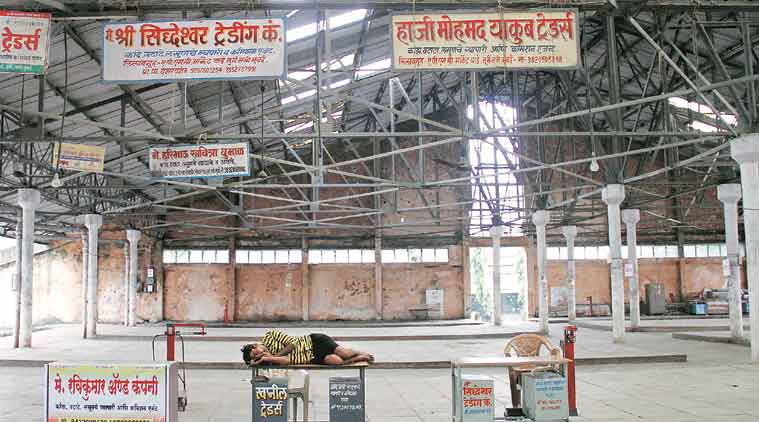- India
- International
Agri-market reforms: The direct selling challenge
Opinion is mixed over the benefits to farmers from the Maharashtra government’s move to de-list fruits & vegetables from the APMC Act.
 The Navi Mumbai APMC market at Vashi. (Express Photo: Narendra Vaskar)
The Navi Mumbai APMC market at Vashi. (Express Photo: Narendra Vaskar)
THE Maharashtra government’s recent move to “de-list” fruits and vegetables (F&V) from the Agricultural Produce Marketing Committee’s (APMC’s) schedule has generated lot of hope, but questions remain over how it would actually help the farmer — the ostensible beneficiary of what is being billed as a “big reform” move.
To start with, what exactly has changed? The previous Congress-NCP regime in Maharashtra had already, in 2006, amended its APMC Act to allow private traders and corporates to buy not just F&V, but all farm produce, under a so-called direct marketing licence (DML) system. Under it, the government offered such licences to those wanting to buy directly from farmers, by-passing the regulated APMC mandis. The DMLs were against furnishing of bank guarantees of up to Rs 15 lakh, primarily intended to ensure farmers got their payments in case of trader defaults.
About 200 DMLs have been issued so far under the 2006 amendment, but most of them are dormant. By the state government’s own admission, only 75-odd licences issued are “active” and the value of purchases undertaken against them is a fraction of the trades happening in mandis under APMC jurisdiction.
[related-post]
Watch Video: What’s making news
The current BJP-Shiv Sena government has “de-listed” F&V, but there is no de-licensing yet. The bank guarantee also continues to be the same, though Sunil Porwal, additional chief secretary (Agriculture) in the state government, says that the Rs 15 lakh amount is being planned to be brought down to Rs 1 lakh. Besides, traders have been exempted from paying licence fee of up to Rs 50,000 and the 1 per cent cess now imposed even on purchases made outside of APMC mandis.
“These (bank guarantee, licence fee and cess) were not big issues anyway. If you still need to procure licences for buying F&V outside APMC mandis, what really has changed?”, asks an expert who does not want to be named.

The current “active” DML buyers include the Tatas, Aditya Birla, Reliance, Big Bazaar, ITC, ADM Agro, Mahindra & Mahindra and other such big corporates. But their aggregate purchases from farmers in Maharashtra are estimated at not more than Rs 1,000 crore annually, as against trades of Rs 60,000-75,000 crore inside APMC mandis (depending on drought/no-drought years) and another Rs 25,000 crore in village and other informal markets.
“The question really is: Why have the big players not latched on to the 2006 offer in a big way so far? Why should we expect things to change now, when all that has been done is to de-list, but not de-licence F&V purchases, which account for about 15 per cent of total APMC trades?”, the earlier quoted expert points out.
Farmers, moreover, were always free to sell to anyone, even outside the APMC areas. But that alone hasn’t enabled them to take their produce directly for selling in urban centres or city markets. “This was not possible for individual farmers earlier and will not be possible even with the latest reform,” the expert adds, while citing the examples of Delhi (where de-listing of F&V happened two years ago), Bihar (which did away with the APMC Act 10 years ago) and Kerala (which never had an APMC law): “No one can claim that farmers in those states are better off than those in Maharashtra?”.
Farm activist Vijay Jawandhiya goes a step further, by noting that states like Andhra Pradesh, Tamil Nadu, Punjab and Haryana have in the past set up ‘apni mandis’ and ‘rythu bazars’ for farmers to sell produce directly to city consumers. But these have hardly brought any relief, as few farmers can afford to take their produce to sell in these so-called farmers’ markets.
Aniruddha Deshpande and Anil Bothe, both progressive farmers from Mahalgaon village in Umred tehsil of Nagpur district, concur with Jawandhiya: “Neither we nor most other farmers have the time to sell directly to consumers. We simply load our produce on a vehicle that comes to our village and send it to traders at the Mahatma Phule vegetable mandi in Nagpur. It is easier for us to pay the middleman who facilitates the sale”. Shridhar Thakre, who heads an orange farmers’ cooperative called Mahaorange, is somewhat more optimistic. De-listing of F&V, he believes, can potentially bring new buyers for the produce of farmers, and help fetch good prices in the future. But farmers can take advantage of this only if they are able to aggregate their own produce through producer organisations. That would help improve their overall bargaining power with the buyers.
Mahaorange has about 500 orange farmers from the Vidarbha region attached to it. The cooperative did business of about 1,400 tonnes in 2015-16, including selling in places like Bengaluru, Hyderabad and Kolhapur. But compared to Vidarbha’s annual production of roughly seven lakh tonnes, this is a pittance.
The Maharashtra government’s Sunil Porwal admits that most farmers are in no position to directly reach consumers due to transport and time factors. “The farmer needs some middleman today. But we expect more farmer producer organisations (FPOs), self-help groups and private companies to come in, which will bring about the desired effect in due course. What we have done is to make available an additional sale option for farmers other than middlemen, so that the latter don’t take complete control of the system as is the case now,” he observes.
Sunil Pote, president of Yuvamitra Sanstha Nashik, a NGO working with 12 FPOs as a backward and forward integration facilitator in pomegranate and onions, welcomes the Maharashtra government’s ordinance that de-lists F&V from the state’s APMC Act. But he feels that the government should simultaneously create more market yards in all districts, to enable farmers bring and sell their produce themselves: “If this is not done, you will see the same APMC traders taking over purchases outside the mandis as well, bringing the situation back to square one”.
Right now, there are a few shining examples of non-APMC private markets, such as the Perfect Krishi Market Yard at Nashik that deals in pomegranate. Run by a former APMC agent-trader Bapu Pingle, the yard has all modern facilities, from lodging and sanitation to packaging and grading for farmers, and does an annual turnover of around Rs 500 crore. “I get anywhere from 2 to 5 lakh growers every year and they come from as far as Gujarat, Madhya Pradesh and Karnataka. There are middlemen here, but we ensure payments are made within an hour of sale,” he claims.
The ultimate solution, most agree, is to have big private players investing in value chains. But that’s easier said than done, since such investments would bear fruit only in the long run. It also explains why banks, too, aren’t really interested in extending credit to these projects, despite their qualifying for priority sector lending. “Unless the non-APMC share of F&V purchases grows to 25 per cent, as it is today in the dairy sector, the dream of farmers getting better prices will not be realised. The current share of below 1 per cent simply isn’t enough to build pressure on traders to give farmers their due,” states Sudhir Kumar Goel, former additional chief secretary (Agriculture).
Maharashtra, at present, has some 800 FPOs reaching out to three lakh-odd farmers. Corporates, on the other hand, have a few thousand farmers each attached to them. Clearly, these are not adequate to address the “direct marketing” needs of the millions of farmers in the state.
However, Kishor Toshniwal, director of marketing in the Maharashtra government, argues that the lack of infrastructure for direct marketing by farmers now has been largely due to the absence of reforms. The latest move will pave the way for investments, more so “when we already have some big players in this sector”.
Kishore Biyani, who heads the country’s largest retail chain Future Group, is supportive of the Maharashtra government’s decision. “My company is already working with a few thousand farmers to help them get better prices for their produce. We have our own supply chain, but more of these will now come up,” he says.
Ashok Sharma, agri-business head of M&M, is equally optimistic about increased private investment following the decision to de-list F&Vs. His company claims to have created one of the largest value chain infrastructure for grapes and “we are working with 1,000 farmers.”
Apr 23: Latest News
- 01
- 02
- 03
- 04
- 05






































